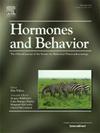将老年雌性猕猴作为人类更年期和激素疗法的转化模型。
IF 2.5
3区 医学
Q2 BEHAVIORAL SCIENCES
引用次数: 0
摘要
由于缺乏能准确再现这些年龄相关变化的动物模型,人们在了解绝经后女性生理和行为变化原因方面的研究进展受到了阻碍。在这里,我们评估了雌性猕猴(Macaca mulatta)的转化潜力。与女性一样,这些长寿的昼伏夜出灵长类动物在衰老过程中表现出明显的神经内分泌变化,以及睡眠-觉醒周期紊乱和认知能力下降。此外,老年猕猴的大脑显示出一些与人类相同的阿尔茨海默病病理特征,包括淀粉样变性和牛磺酸病理学。重要的是,与人类不同,猕猴可以在严格控制的环境条件下饲养,如光周期、温度和饮食,而且可以在死后零间隔时间内采集组织;这使得它们特别适合用于旨在阐明潜在分子机制的研究。雌性猕猴的最新研究结果有助于阐明性激素如何影响大脑中的基因表达,以及如何促进认知功能的维持和年龄相关病症的改善。总之,这些发现强调了雌性猕猴作为模型的转化价值,有助于阐明绝经后妇女正常和病理变化的因果机制。它们还为开发安全有效的疗法提供了一个实用的平台。本文章由计算机程序翻译,如有差异,请以英文原文为准。
The aged female rhesus macaque as a translational model for human menopause and hormone therapy
Progress in understanding the causes of physiological and behavioral changes in post-menopausal women is hampered by the paucity of animal models that accurately recapitulate these age-associated changes. Here we evaluate the translational potential of female rhesus macaques (Macaca mulatta). Like women, these long-lived diurnal primates show marked neuroendocrine changes during aging, as well as perturbed sleep-wake cycles and cognitive decline. Furthermore, the brains of old rhesus macaques show some of the same pathological hallmarks of Alzheimer's disease as do humans, including amyloidosis and tauopathology. Importantly, unlike humans, rhesus macaques can be maintained under tightly controlled environmental conditions, such as photoperiod, temperature and diet, and tissues can be collected with zero postmortem interval; this makes them especially suitable for studies aimed at elucidating underlying molecular mechanisms. Recent findings from female macaques are helping to elucidate how sex-steroids influence gene expression within the brain and contribute to the maintenance of cognitive function and amelioration of age-associated pathologies. Taken together, these findings emphasize the translational value of female rhesus macaques as a model for elucidating causal mechanisms that underlie normative and pathological changes in post-menopausal women. They also provide a pragmatic platform upon which to develop safe and effective therapies.
求助全文
通过发布文献求助,成功后即可免费获取论文全文。
去求助
来源期刊

Hormones and Behavior
医学-行为科学
CiteScore
6.70
自引率
8.60%
发文量
139
审稿时长
91 days
期刊介绍:
Hormones and Behavior publishes original research articles, reviews and special issues concerning hormone-brain-behavior relationships, broadly defined. The journal''s scope ranges from laboratory and field studies concerning neuroendocrine as well as endocrine mechanisms controlling the development or adult expression of behavior to studies concerning the environmental control and evolutionary significance of hormone-behavior relationships. The journal welcomes studies conducted on species ranging from invertebrates to mammals, including humans.
 求助内容:
求助内容: 应助结果提醒方式:
应助结果提醒方式:


